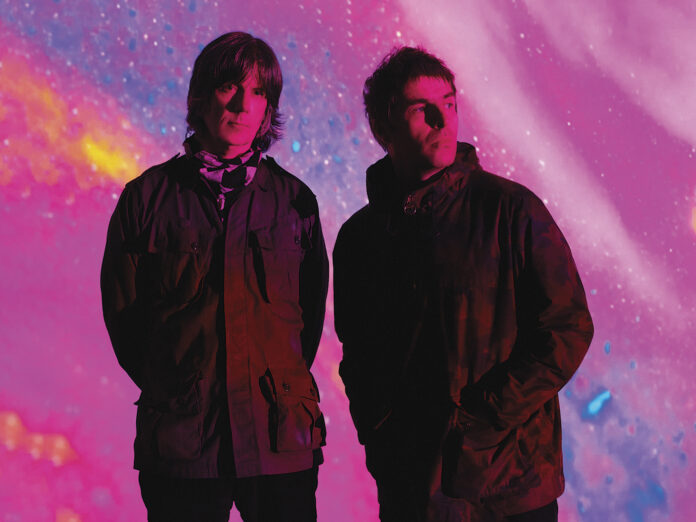Imagine the Stone Roses with an immeasurably better singer modelled on Ian Brown, or Oasis with a dazzling lead guitarist. Liam Gallagher and John Squire have, and the resulting album plays to their strengths. Though coming almost out of the blue, it’s the most logical team-up among the remnants of Manchester’s old indie-rock imperium, currently awash with severed alliances searching for completion.
Imagine the Stone Roses with an immeasurably better singer modelled on Ian Brown, or Oasis with a dazzling lead guitarist. Liam Gallagher and John Squire have, and the resulting album plays to their strengths. Though coming almost out of the blue, it’s the most logical team-up among the remnants of Manchester’s old indie-rock imperium, currently awash with severed alliances searching for completion.
PINK FLOYD ARE ON THE COVER OF THE NEW UNCUT – ORDER YOUR COPY HERE
Liam and Noel were a more extreme version of Morrissey and Marr’s sundering of stellar charisma and musical genius, with Liam’s songwriting vestigial when Oasis split in 2009, and Noel’s vocals reserved for sensitive, doubting songs Our Kid couldn’t sing. Innately cautious, Noel’s albums have nudged at the edges of Oasis’s formula, finding on last year’s Council Skies a sweet spot between middle-aged reflection on his Burnage past and canny Oasis-esque bangers. Liam also hinted at maturity on 2022’s C’mon You Know, but he’s generally been laser-focused on claiming Oasis’s essence and audience for himself, replaying Knebworth, and Definitely Maybe on June’s upcoming 30th-anniversary tour.
Squire was more evenly partnered with Ian Brown in The Stone Roses, but has also proved dependent on his combustible singer for a mass audience the Seahorses couldn’t supply. His time since the Roses’ 2010s reunion has been self-sufficiently private, balancing visual art with family life’s quiet satisfactions. Liam’s invitation to guest on “Champagne Supernova” at Knebworth opportunely coincided with Squire’s renewed interest in guitars and songwriting. Liam followed up by specifically requesting guitar-heavy songs with Squire lyrics for this project.
This is therefore a Squire-centred record, demoed by him at his Macclesfield home studio while Liam emailed broad stokes of musical direction – the Pistols, Hendrix, Faces and Bee Gees. LA sessions were produced by Greg Kurstin (Adele, McCartney’s Egypt Station and much of Liam’s solo debut As You Were), who rounded out the band on bass and piano alongside drummer Joey Waronker. Squire wanted imperfections, “something slightly out of time, a bit sloppy”. Happily out of the star game for so long, his influence on a singer who has to be a star is key to their collaboration.
Opener “Raise Your Hands” suggests Liam is getting his Definitely Maybe tour prep in early, with a bouncy Britpop beat brightened by Squire’s gleaming jangle. Anthemic lyrics secrete a sardonic edge more innate to the Roses than today’s soft-spoken Squire lets on: “If revenge is all that really matters…/Raise your hands.” Liam’s vocal starts as he’ll continue, higher and therefore more vulnerable than usual, relaxed and kind, the cracked grain that usually channels punk gravel now aiding genuine warmth. Squire’s guitar counterpoints West Coast vocal harmonies, with a scratchy blues-rock solo meeting Kurstin’s barrelhouse piano on the fade.
Where Liam’s solo albums provide aspects of his Lennon-worshipping yet sunny worldview, while often sounding written and recorded by committee, this duo debut is unmistakably authored. “Jesus Christ, about last night/I can only apologise,” “Mars To Liverpool” starts, before entering Northern psychedelic realms: “If your travel agent’s cool/Can anybody get me/From Mars to Liverpool?” Liam’s elasticating emphasis of “cool” and “pool” is almost worth the admission. The music, meanwhile, splices The La’s’ “There She Goes” and The Beatles’ “Here Comes The Sun”. The Fabs scoreboard elsewhere notches references to Wings’ “Let Me Roll It” and Plastic Ono Band’s heavy primal scream blues on “I’m A Wheel”, “I Feel Fine” on “Love You Forever”, “Getting Better” on “Make It Up As You Go Along”, and the phased guitars, pounding Revolver drums and lysergic effects of “Just Another Rainbow”. The latter’s five-and-a-half minutes has room for windmilling Who clamour too. Its lyric, Squire’s said, deals with “disappointment, and the sentiment that you never get what you really want”, disillusion Liam couldn’t concede on his own.
The Roses helped legitimise looking back in UK rock, rehabilitating The Beatles for Oasis to fully ransack, yet “Fool’s Gold” also offered a tantalising dance-rock way forward. Oasis similarly developed their punk- and rave-inflected Beatlemania into the majesty of “Champagne Supernova”. Squire draws on this old ambition in “One Day At A Time”. “Welcome back to the land of the living,” he has Liam sing, “We’ve got so many people to be.” Suggesting both “I Am The Resurrection”’s skyscraping lift-off from working-class circumstance and Bowie-like possible persona, Squire twists into a vicious kiss-off: “I know you’re happy in your suburban trance/You should have fucked me when you had the chance.”
Though they each had one eye on the past, The Stone Roses put Squire’s guitar in a radical context, while Oasis’ white-noise clamour was a pioneering new sound made from familiar ingredients; by contrast, Liam Gallagher John Squire is an essentially conservative record of relaxed, early-’70s rock. If the tunes and attitude don’t grip as strongly as they did in either man’s era-bending pomp, both still sound better for getting together. With their regular partners perhaps permanently out of creative reach, this unheralded partnership has strong prospects.



